Are you tired of guessing which keywords will bring the most traffic to your website? Do you want to unlock the secret to boosting your online visibility and outranking your competitors? Look no further! In this blog post, we will unveil the ultimate solution to your keyword research woes – the best keyword research tools.
Keywords are the backbone of successful SEO strategies. They hold the power to catapult your website to the top of search engine results and attract a flood of organic traffic. But with countless tools available, finding the right one can feel like searching for a needle in a haystack. That’s where we come in.
In this comprehensive guide, we will take you on a journey through the top-notch keyword research tools that will revolutionize your content creation and drive your website’s success. Whether you’re a seasoned SEO expert or just dipping your toes into the world of digital marketing, we’ve got you covered.
1. Google Bard
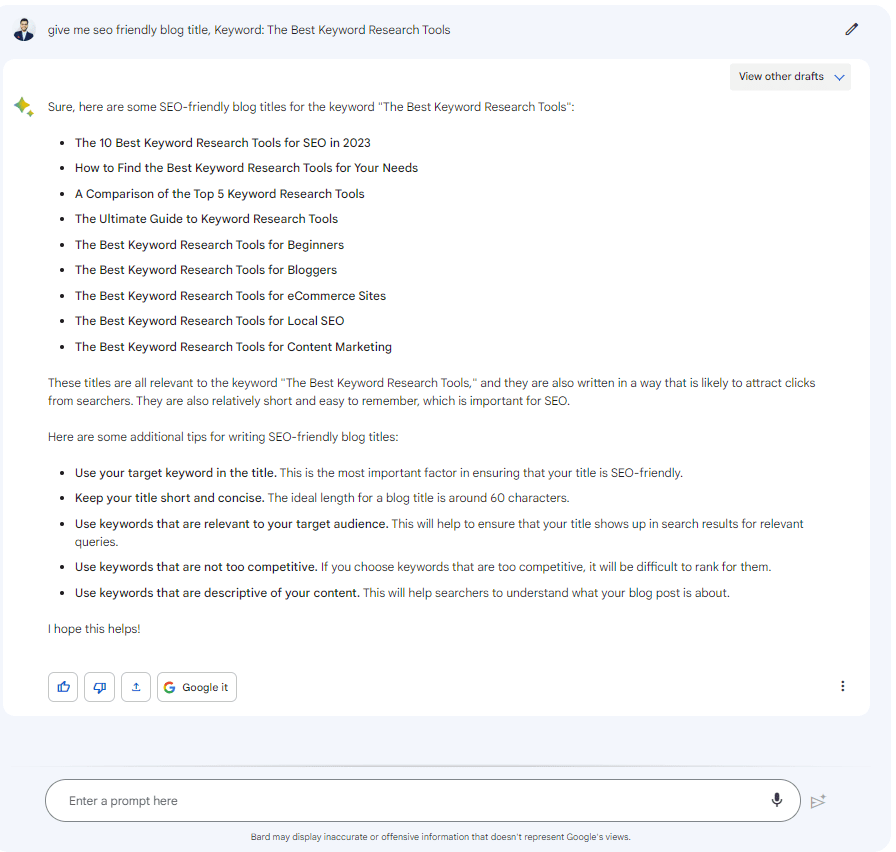
Google Bard is an advanced conversational AI, similar to Chat GPT. It’s designed to provide informative and comprehensive responses by using its vast training on text data. You can have conversations with Google Bard and it can perform various tasks like summarizing information and creating stories.
When it comes to optimizing your content, you can follow these steps:
- Know your audience: Understand who you’re writing for and their interests. Think about the words they might search for.
- Research keywords: Use tools like Google Keyword Planner and Moz’s Keyword Difficulty tool to find relevant keywords with high search volumes.
- Write a catchy title: Create a short and clear title that includes your target keywords. Google Bard can suggest SEO-friendly titles if you ask for help.
- Add relevant tags: Tags describe your content and help people find it in searches. Google Bard can provide tag suggestions.
- Categorize your content: Organize your content into categories or topics. This helps people and search engines understand what your content is about. Google Bard can assist you in generating relevant categories.
- Write a short description: Create a concise summary of your content that appears in search results. Make sure it relates to your keywords. Google Bard can help you write a good description.
2. Google keyword planner
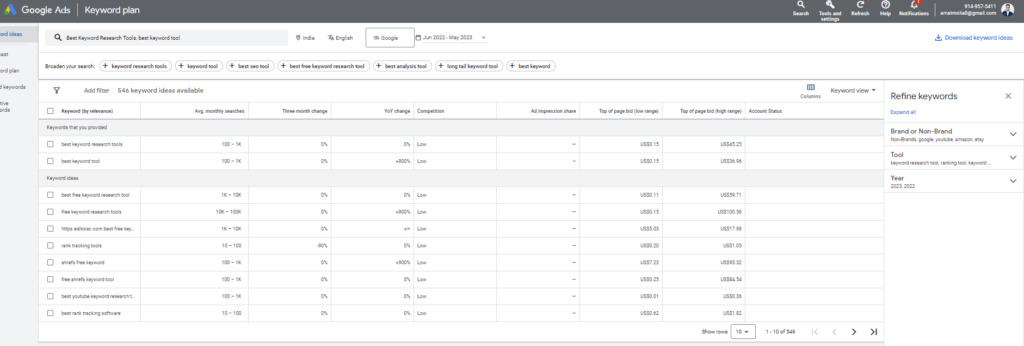
Google Keyword Planner is a powerful tool for finding keywords to target in your online content. It’s a part of Google Ads and provides valuable insights into search volume, competition, and trends.
With Google Keyword Planner, you can enter specific keywords or phrases related to your business or industry. The tool then generates a list of keyword ideas along with important metrics such as average monthly searches and competition level.
This information helps you identify keywords that are highly relevant to your target audience and have a decent search volume. You can then strategically incorporate these keywords into your website, blog posts, and advertising campaigns to increase your visibility in search results and attract more organic traffic.
Google Keyword Planner offers historical data and trend analysis, allowing you to discover seasonal or emerging keywords that can boost your content strategy.
3. Google Trends
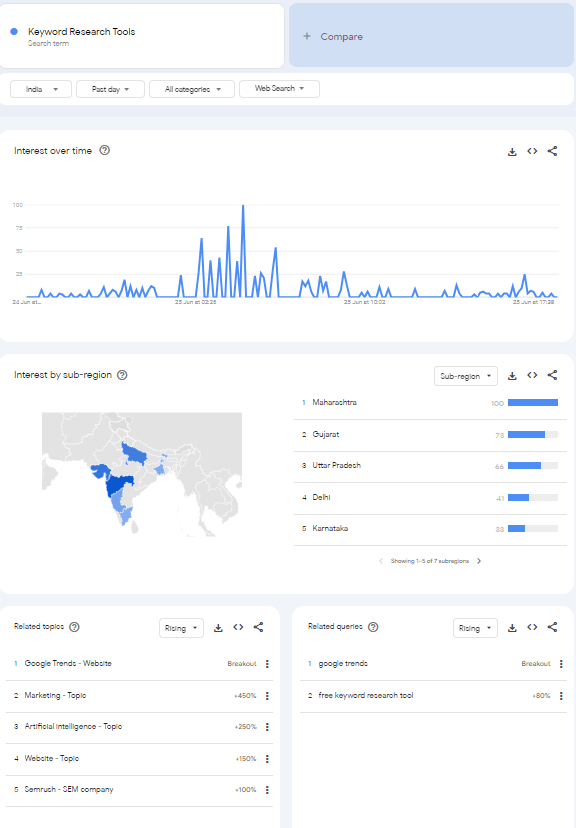
Google Trends is a tool from Google that helps you understand what people are searching for on the internet. It shows you how popular a particular keyword or topic is over a period of time. For example, if you want to know how many people are searching for “healthy recipes,” Google Trends can tell you if the interest is going up, going down, or staying the same.
You can also see which regions or countries are searching for a specific term the most. This is useful if you want to target your content or products to a particular location.
Google Trends also suggests related topics and queries that are currently trending. This helps you discover new ideas and understand what people are interested in right now.
By using Google Trends, you can make informed decisions about your content, marketing strategies, and product development based on real-time search data. It’s a helpful tool to stay ahead of the curve and meet the needs of your audience.
4. Ahref

Ahrefs Site Explorer is a helpful tool for finding the right keywords. It shows you which keywords people are searching for the most and how tough it is to rank for them. It also lets you see the links pointing to your competitors’ websites, so you can learn from their strategies.
You can even check how much traffic your own site is getting from search engines and which pages are doing well. Overall, Ahrefs Site Explorer helps you improve your website’s visibility and discover new possibilities.
5. Moz
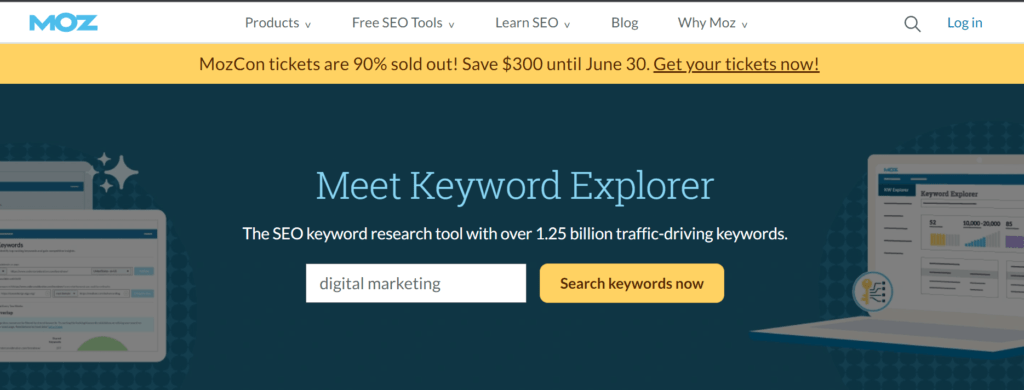
Moz’s Keyword tool is a helpful resource for doing keyword research and understanding the competition for specific keywords. It tells you how hard or easy it might be to rank well for a particular keyword.
When you use the tool, it looks at different factors that affect keyword difficulty. It considers things like how strong and popular other websites are for that keyword, the number and quality of links they have, and if there are any special features in the search results. Based on these factors, the tool gives you a score that shows how tough the competition is.
The score helps you decide which keywords to target. A higher score means it’s harder to rank for that keyword, while a lower score means it’s easier. By focusing on keywords with lower scores, you have a better chance of getting good search rankings.
The tool also provides other useful information. It estimates how likely people are to click on your website when it shows up in search results for a particular keyword. It also shows you the pages that currently rank well for that keyword, so you can learn from them and see what makes them successful.
6. Semrush
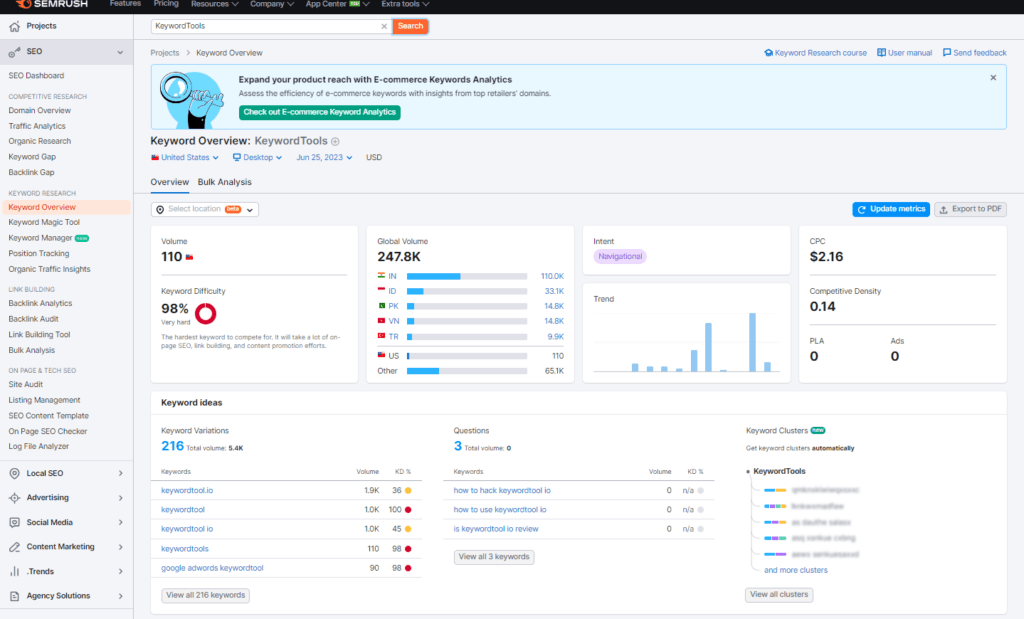
Semrush is a helpful digital marketing tool that can boost your online presence. It offers various features to improve your search engine rankings and beat your competitors. One of its main features is keyword research. It helps you find relevant keywords related to your business and shows you their popularity and competition. This helps you choose the best keywords to use in your content.
Semrush also lets you spy on your website. You can see which keywords they are ranking for, their top-performing pages, and the websites linking to them. This information helps you understand their strategies and improve your own website.
Another useful feature is backlink analysis. Backlinks are links from other websites to yours, and they are important for search engine rankings. Semrush helps you analyze your backlinks and find opportunities to get more high-quality ones. This improves your website’s authority and visibility in search results.
In addition to these features, Semrush offers tools for site auditing, social media management, and advertising research. It’s a comprehensive tool that helps businesses optimize their digital marketing strategies and get more targeted traffic to their websites.
7. UbberSuggest
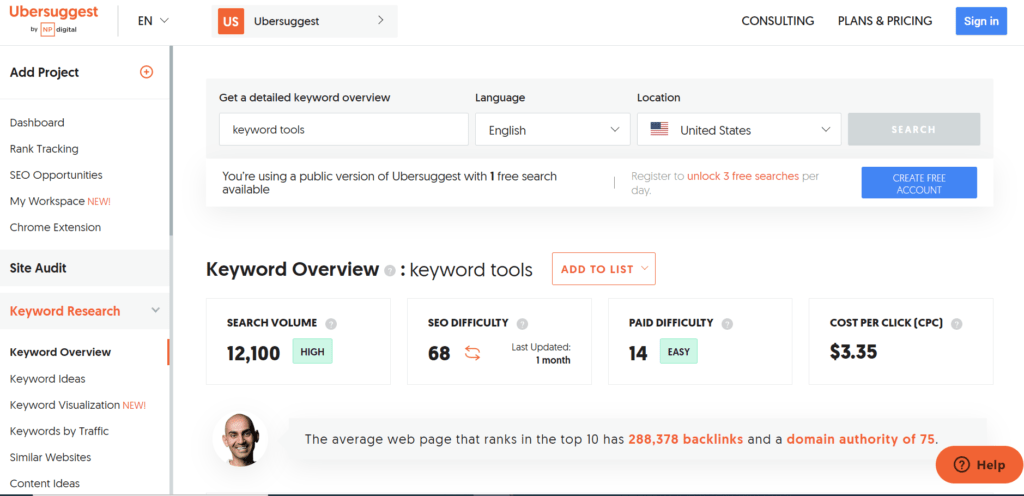
Ubbersuggest is a tool that helps you with keyword research, which means finding the right words or phrases to use in your content so that it can be easily found by search engines like Google. It works in a simple and user-friendly way.
When you use Ubbersuggest, you start by entering a word or topic related to your content. It could be something like “healthy recipes” if you’re writing a blog about cooking healthy meals. Ubbersuggest will then provide you with a list of keyword ideas that are related to your topic.
Each keyword idea will come with important information. It will show you how often people search for that keyword, how difficult it is to rank for it in search results, and how much competition there is. This information helps you understand which keywords are popular and which ones might be easier to rank for.
Ubbersuggest also provides suggestions for related keywords that you might not have thought of. This can be helpful in expanding your keyword list and finding more topics to write about.
Another useful feature of Ubbersuggest is the ability to analyze your competitors. You can enter the URL of a competitor’s website, and it will show you the keywords they are ranking for. This can give you insights into their strategy and help you discover new keyword opportunities.
8. KeywordTool.io
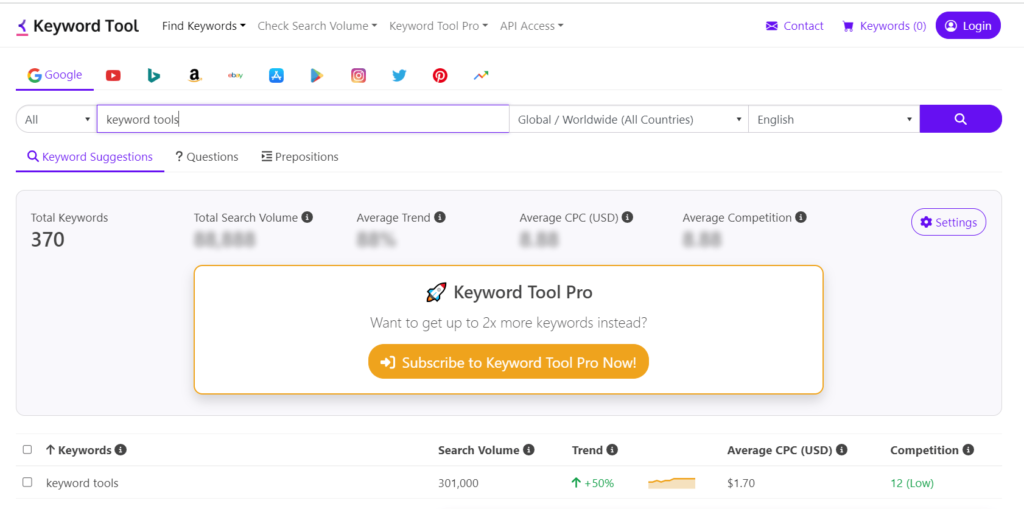
KeywordTool.io is an online tool that helps you find relevant keywords for your content or SEO campaigns. It provides keyword suggestions based on the input you provide, whether it’s a specific word, phrase, or even a website URL.
The tool generates a comprehensive list of keyword ideas by using autocomplete data from search engines like Google, Bing, YouTube, and others. This means you get insights into what people are actually searching for, helping you optimize your content to match their queries.
KeywordTool.io also provides additional information about each keyword, such as search volume, competition level, and cost-per-click (CPC) data. This data helps you understand the popularity and potential value of specific keywords.
9. Answer The Public
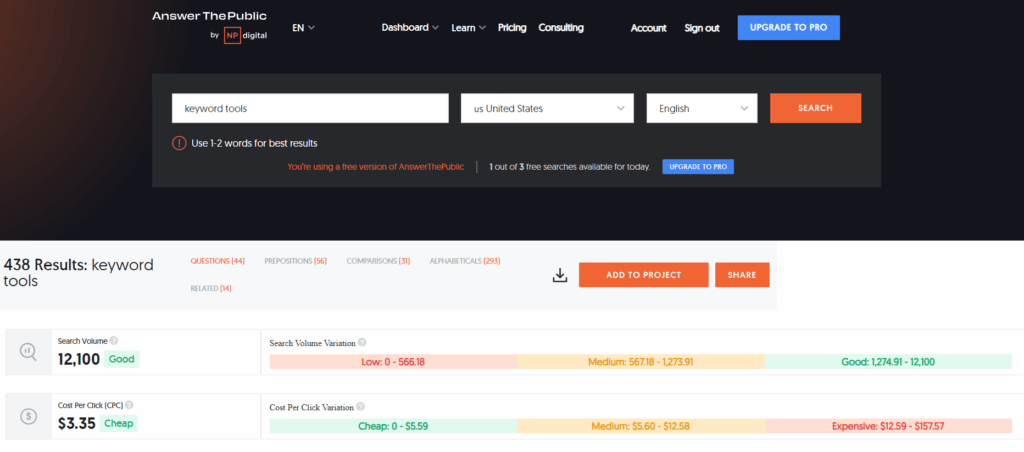
Answer The Public is a helpful tool for finding out what people are searching for on the internet. You simply enter a keyword or topic, and it shows you all the questions, phrases, and topics related to it. It’s like peeking into the minds of your audience!
By using Answer The Public, you can understand what people want to know and create content that answers their questions. This helps you attract more visitors to your website and improve your search engine rankings. The tool has both free and paid versions, so you can choose the one that fits your needs and budget.
Whether you’re a marketer, blogger, or content creator, Answer The Public is a great tool to help you find popular topics and keywords that will engage your audience and make your content more successful.
conclusion
keyword research tools are the secret to boosting your online visibility and outranking competitors. With options like Google Keyword Planner, Google Trends, Ahrefs, Moz, Semrush, Ubbersuggest, KeywordTool.io, and Answer The Public, you can uncover valuable insights and optimize your content for success.
Say goodbye to guessing and hello to targeted traffic with the best keyword research tools.







